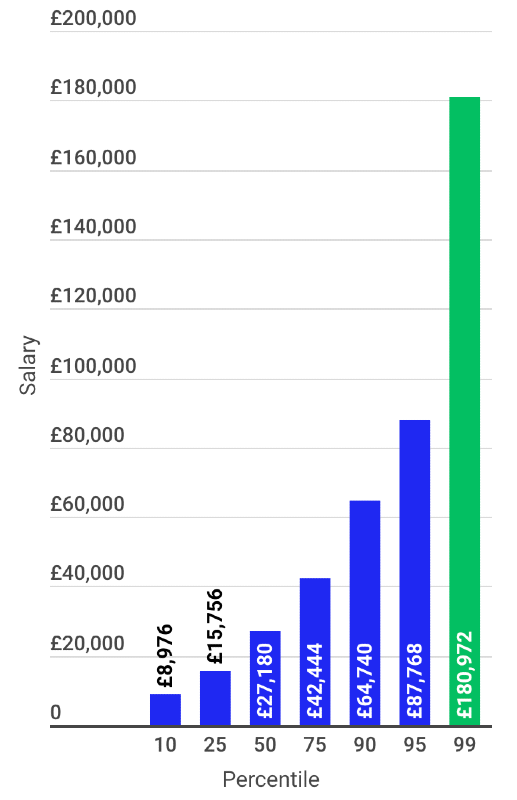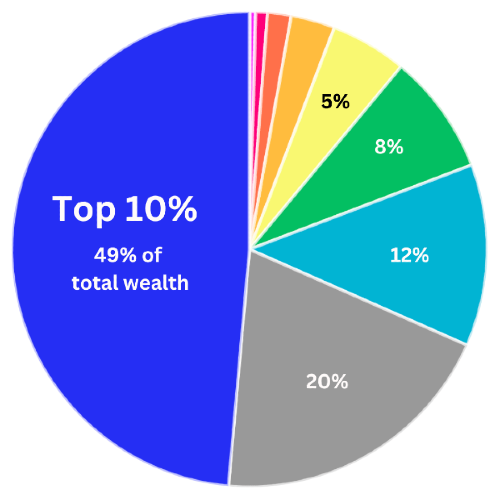What is a top 1% income in the UK?
To be in the top 1% of earners in the UK you need to earn more than £180,000. This article dives into how far that gets you, how it compares globally, and lots of other stuff.
Key takeaways
- To be in the top 1% of UK earners, you need to earn more than £181,000.
- Around 600,000 people earn more than £181,000 in the UK.
- £180,972 is roughly £8,000 to £9,000 per month in take home pay.
- If you earn £180,000, you earn around £145,000 more than the average UK employee.
Table of contents:
- What is a top 1% income in the UK?
- What does £181,000 a year look like after tax?
- What percentage UK income does the 1% make?
- What is a top 5% and top 10% income?
- What is a top 1% net worth in the UK?
- How does being a top 1% UK earner compare globally?
- What jobs pay enough to put you in the top 1%?
- Frequently asked questions
What is a top 1% income in the UK?
According to ONS data from June 2023, the top 1% of employees in the UK earn £15,081 or more per month before tax. Annually, this figure is £180,972.

According to the Institute for Fiscal Studies, the top 0.1% earn more than £500,000 a year. There are only around 500,000 people who make that much money in the UK.
What does £181,000 look like after tax?
| Year | Month | Week | |
| Gross Wage | £180,972 | £15,081 | £3,480 |
| National Insurance | £6,949 | £595 | £137 |
| Pension | £5,429 | £452 | £104 |
| Pension HMRC | £2,443 | £204 | £51 |
| Student Loan | £0 | £0 | £0 |
| Take Home Pay | £103,396 | £8,601 | £1,985 |
| Tax Free Allowance | £0 | £0 | £0 |
| Tax Paid | £65,197 | £5,433 | £1,254 |
| Taxable Wage | £175,543 | £14,629 | £3,376 |
What percentage UK income does the 1% make?
The top 1% of UK earners take home around 13% to 14% of the country's total income. This means that the wealthiest 1% of the population pulls in roughly 13% to 14% of all the money earned in the UK.
Back in the 1980s, the top 1%'s share of overall earnings shot up during a time when inequality overall was on the rise. Through the 1990s and 2000s, they widened the gap from everyone else, despite stable or decreasing inequality among most people. This trend continued until the financial crisis hit in 2007.
What is a top 5% and top 10% income?
If you earn £80,000 or more that puts you in the top 5%. If you earn over £60,000 that puts you in the top 10%.
These figures are as of 2023, so they're likely to change when the ONS releases new data in 2024 - especially given the high inflation environment we've been living in since Covid.
The pie chart below shows how much of the UK's total wealth is made up by each 'decile' of the UK.
So, for example, in blue you can see that the top 10% of the UK population in terms of wealth controls nearly 50% of the country's wealth as a whole. Similarly, the next 10% controls 20%, then 12% and so on.

What is a top 1% net worth in the UK?
Net worth is different to income, and basically means 'how much money would you have if you sold everything you own'. This includes debts, as well as assets.
A top 1% net worth in the UK equates to around £4,400,000.
The chart below shows how that amount is broken down into asset type, and there's a table below the chart which shows you the real raw numbers.
The latest figures for this data only run up until 2020, so there's likely to have been a fairly large shift in recent years due to inflation.

| Decile | Private pensions | Net Property | Physical | Net financial | Total |
| Top 1% | £2,046,700 | £1,310,000 | £267,400 | £779,400 | £4,403,500 |
| 10th | £1,035,100 | £580,000 | £125,200 | £201,000 | £1,941,300 |
| 9th | £520,200 | £350,000 | £81,500 | £79,500 | £1,031,200 |
| 8th | £292,700 | £280,000 | £71,000 | £41,800 | £685,500 |
| 7th | £180,400 | £210,000 | £57,000 | £22,900 | £470,300 |
| 6th | £97,600 | £178,000 | £51,100 | £12,900 | £339,600 |
| 5th | £56,700 | £115,000 | £43,700 | £6,800 | £222,200 |
| 4th | £38,200 | £53,000 | £36,000 | £2,000 | £129,200 |
| 3rd | £15,800 | £0 | £30,500 | £1,000 | £47,300 |
| 2nd | £2,500 | £0 | £20,000 | £500 | £23,000 |
| 1st | £0 | £0 | £8,000 | £0 | £8,000 |
As you can see from the table above, the richest 1% have over double the total wealth of people even in the remaining 9% of the top 10%!
That's a power law for you.
How does being a top 1% UK earner compare globally?
As of 2019, an individual would need to earn more than $400,000 a year to join the top 1%, which equates to roughly £320,000 in Pounds.
The table below shows a mix of some of the world's wealthiest countries, and the amount you'd need to earn, in US Dollars, to break into the top 1% of that country.
| Country | Top 1% salary | (In GBP) |
| Luxembourg | $800,000 | £600,000 |
| Singapore | $750,000 | £562,500 |
| UAE | $700,000 | £525,000 |
| Switzerland | $600,000 | £450,000 |
| Qatar | $600,000 | £450,000 |
| Hong Kong | $600,000 | £450,000 |
| Norway | $500,000 | £375,000 |
| United States | $500,000 | £375,000 |
| Japan | $400,000 | £300,000 |
| Denmark | $400,000 | £300,000 |
| Ireland | $350,000 | £262,500 |
| France | $280,000 | £210,000 |
| Germany | $250,000 | £187,500 |
| United Kingdom | $250,000 | £187,500 |
| Canada | $230,000 | £172,500 |
| Italy | $220,000 | £165,000 |
| China | $150,000 | £112,500 |
| Brazil | $120,000 | £90,000 |
What jobs pay enough to put you in the top 1%?
As you'd expect, it's no walk in the park to become a top 1% earner in the UK.
The list of industries and jobs below might give you some ideas:
- Finance and Investment Banking: £150,000 - £1,000,000+
- Law – especially Partners in Law Firms: £150,000 - £1,000,000+
- Medicine and Specialist Doctors: £100,000 - £500,000+
- Corporate Executives and CEOs: £150,000 - £1,000,000+
- Tech Industry – Software Engineers, Data Scientists: £70,000 - £300,000+
- Engineering – especially in Oil and Gas, Aerospace, etc.: £70,000 - £500,000+
- Entertainment and Media – Actors, Directors, Producers: Varies widely, can reach millions
- Entrepreneurship and Business Owners: Varies significantly based on business success
- Management Consultants: £80,000 - £300,000+
- Top-level Academia and Research Positions: £80,000 - £300,000+
Frequently asked questions
- What salary is 'upper class' in the UK?
- In the UK, an annual salary in the range of £150,000 to several million pounds is often associated with being in the 'upper class'. However, the term 'upper class' is also defined by wealth, social status, and influence - things beyond just income.
- Is 100k a good salary in the UK?
- In short, absolutely. If you want to read a full breakdown of 100k and how far it goes in the UK, then read our full guide to whether 100k is a good salary or not.
- What is a decent salary in the UK?
- In the UK, a decent salary could be considered around £30,000 to £40,000 per year. This range allows for comfortable living, covering essential expenses, and having some discretionary income for savings or extras.

